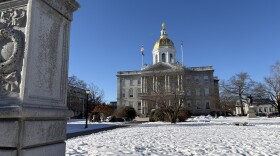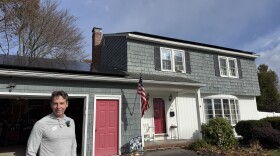New Hampshire’s Public Utilities Commission has issued a decision on the state’s net metering policy that could have ripple effects for the state’s renewable energy industry.
Regulators will keep net metering rates the same as they've been since 2017, arguing there wasn’t enough evidence to support changing rates one way or another. Those rates demonstrate how small scale renewable energy resources are valued and compensated for the power and the role they provide on the electric grid.
The Public Utilities Commission has been looking into the issue of fair compensation for small, local energy resources in New Hampshire for years. In a decision last week, commissioners cast doubt on a state-requested study meant to help determine the value of small renewables on the grid. It calculated the value of small renewables based on their ability to avoid certain costs, like transporting electricity long distances.
Commissioners said they had concerns about that study and couldn't rely on it to determine fair net metering rates. Instead, those regulators are putting forward a separate process to begin new hearings on what a net metering overhaul could look like.
The commission also rejected proposals to create a 20-year “legacy period,” which would have provided certainty for energy developers about the lives of their projects. (Contracts for community-scale projects generally last 20 years or more). The current rates are set to expire in 2040.
Some advocates and industry leaders say without that legacy period, solar development in New Hampshire could continue to fall behind other New England states.
“Without some sort of certainty and some sort of regulatory business assurance that there's going to be a program in the future, this really is going to amount to sort of a slow strangling of the local renewable energy industry,” said Sam-Evans Brown, executive director of Clean Energy New Hampshire.
Dan Weeks, a vice president at Revision Energy, said his industry was prepared for the commissioners to slash net metering rates, so it was encouraging to see the rates kept as they are.
But, he said, keeping rates as they are means small renewables are being compensated less than they seem to be worth, according to the study the state commissioned in 2017. And without a legacy period, investors will now need to bet on how officials will decide to handle net metering rates within the next 16 years. That could make it challenging to build larger community scale projects, like the kind that provide up to a megawatt of power, enough to power about 160 homes in New Hampshire.
“In the context of a market that is rife with uncertainty, this just adds more uncertainty, which means more reluctance to actually make the investments, to actually put steel in the ground and bring people on,” he said.
That uncertainty may not be as impactful for smaller solar customers, like households that want to put an array on their roof. Those systems generally pay for themselves within eight to 12 years, said Ben Soucy, president of Granite State Solar. But uncertainty of any kind still hurts business, he said.
“Any time people hear about ‘there's an uncertain future for solar,’ even at an individual residential level, there's some portion of the population that will say, ‘Ooh, well, I'm going to wait until that's figured out,’ even though it may not affect them as directly or as significantly,” he said.
Public Utilities Commissioners said they were not convinced a legacy period was necessary, saying the evidence presented in favor of the legacy period was unspecific and anecdotal.
They argued the absence of a 20-year legacy period “will not itself prevent investors from entering long-term financing agreements.”
A vision for a “local energy marketplace”
In addition to their ruling, the commissioners also outlined a process to consider broader changes to the net metering structure in the state based in part on a proposal from the Community Power Coalition of New Hampshire. Sixty four towns and cities and four counties are participating in the Coalition.
That organization is hoping to develop a “local energy marketplace” that would involve larger changes to net metering policy in the state.
In their supplemental order, commissioners laid out a series of new issues for utilities, solar companies, advocates and policymakers to discuss.
Those include changing the rates that power producers can receive, whether small energy generators should be compensated for how much their power helps avoid the cost of transporting energy long distances, and whether energy storage systems should be able to participate in net metering.
Henry Herndon, the coalition’s director of member services, said he was excited that the commissioners were considering solutions that could increase compensation for distributed generation.
“Solar, storage, other local resources, they create more value than what they're being compensated for under net metering,” he said. “Utilities are developing projects to be compensated for those values. And the practical next step is to have market actors do the same thing. So we hope to work with the Commission and other stakeholders to enable that logical next step, which we think will create more value for developers and customers.”
The Public Utilities Commission is asking stakeholders to take on some of the further issues early next year, with a hearing on some topic scheduled for February 2025, and has asked participants to issue a recommendation for further action on net metering by the end of 2025.
Disclosure: Dan Weeks is a member of NHPR’s Board of Directors.
Revision Energy, Granite State Solar, and the Community Power Coalition of New Hampshire are underwriters for NHPR. Board members and underwriters have no influence over the station’s coverage.








